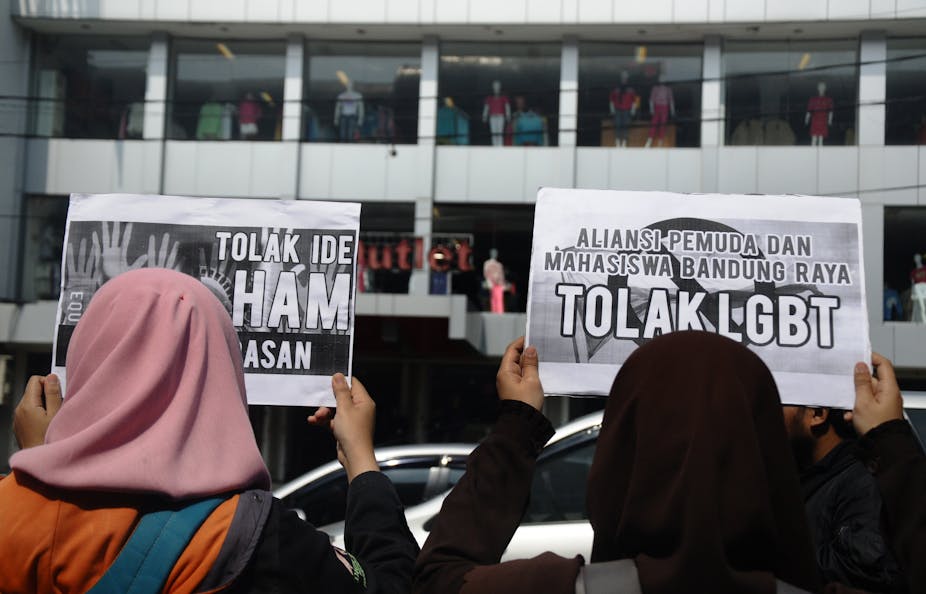In Western academia, it seems common sense that discrimination should have no place in society, including against LGBT (lesbian, gay, bisexual, transsexual/transgender) people.
This achievement is the result of decades of struggle and bitter experiences of LGBT-phobia in Western societies.
Indonesian society, on the other hand, has been historically quite tolerant with people of different gender expression and sexual orientation. But the country has experienced an increasing wave of homophobia in politics and society in the past few years.
This is also the case in Indonesian academia.
I compiled a list of incidents throughout 2016-2021. Though probably incomplete, the list involves many institutions and reveals an intense LGBT-hostile atmosphere among Indonesian universities.
These incidents include, among others, the dismissal of students and staff who share “the LGBT virus”, university-sponsored rallies against LGBT students, and crackdowns on queer-themed academic discussions.
As Western and Indonesian academia continue to engage in co-operation, we should find common ways of counteracting discrimination, including discrimination against people with non-heteronormative gender expressions and identities.
Amplifying state-sponsored homophobia
Over the years, Indonesian universities have joined the state-sponsored homophobia – including law enforcement and statements by politicians fuelling hatred of LGBT people.
Academics often work hand-in-hand with these institutions and rely on statements from religious authorities, while at the same time providing anti-LGBT activists with seemingly scientific arguments.
Within the academic discourse, for instance, some Indonesian scholars (and also students) reproduce the state’s argument that LGBTs are a threat to an imagined national harmony.
In 2016, the then minister of research, Muhammad Nasir, declared LGBT individuals were not welcome at Indonesian universities. He said they “corrupt the morals of the nation”. The then minister of defence, Ryamizard Ryacudu, even said the LGBT movement was part of a proxy war to weaken the nation.
Academics usually refrain from such dramatic statements. But there are some who maintain the idea of LGBTs as a threat.
Indonesian terms for queer gender expressions, both nationally (such as waria or transpuan) and in local cultures (such as bissu in South Sulawesi or tayu in Bengkulu) have increasingly been superseded by the term “LGBT”, which has Western and foreign associations.

Moreover, “LGBT” is linked in both public and academic discourses to derogatory connotations.
Negative stigmas attached to LGBTs in global discourses typically involve pedophilia, Western intervention, pornography and prostitution. However, statements by Indonesian scholars often highlight health issues (LGBTs as a threat that spreads STDs) as well as religious stances.
It is therefore not surprising that anti-LGBT proponents in academia often have a conservative Islamic background.
However, they effectively link their moral claims not only to religion, but also to Indonesian nationalism.
A common example is the use of the phrase, “the young generation of the Indonesian people” (generasi muda bangsa), which is seemingly threatened by sexually transmitted diseases and immoral activities.
Applying the term “bangsa” is an effective tool to connect religious morality with Indonesian nationalism. LGBTs thus emerge as the embodiment of an otherwise vague and abstract threat.
Academics as anti-LGBT activists
Conservative Indonesian scholars gained public attention in 2017 when the Indonesian Family Love Alliance (Aliansi Cinta Keluarga or AILA) sought a judicial review at the Constitutional Court.
They demanded the criminalisation of homosexual activities and LGBT activism, with punishment of up to five years in prison. As usual, these academics argued that LGBTs contribute to the spread of HIV-AIDS.
They also claimed it is unethical that such people get expensive medicine paid for by public health insurance, making ordinary Indonesians pay for them.
Not surprisingly, the language they used referred not only to empirical findings but also moral stances.
Euis Sunarti, a professor at the Bogor Agricultural Institute (IPB), for instance, is an AILA scholar. She teaches in the field of “family resilience and empowerment” (ketahanan dan pemberdayaan keluarga). In her view, LGBT activities threaten the institution of the family, and therefore the state must take action.
Statements from scholars mirror those of religious authorities and state officials. In this way, they further blur the boundary between religion, the state and science.
This anti-LGBT narrative also serves as a tool for unifying Indonesia’s many social and economic groups. Thus, it perpetuates the idea of a harmonious society at the expense of an already marginalised group.
Sadly, it does so by generating fear and prejudice.
Counteracting fear and hate
Many academics from Western countries maintain close ties with scholars and institutions in Indonesia. Since they often support anti-discriminatory actions around the world, they should not turn a blind eye to discrimination against queer people committed by the institutions we are working with.
While open confrontation might not always be effective, I believe critical scholars cannot be quiet when minorities are discriminated against on Indonesian campuses.
The task is not only to challenge pseudo-scientific anti-LGBT discourses in Indonesian academia, but also to evoke empathy for people who are increasingly marginalised and excluded from education due to their gender expressions and identities.
Fortunately, Indonesia is also home to many critical and engaged scholars. Academic institutions in the Global North can find knowledgeable partners among these scholars that we can work with.
However, Western scholars should not avoid controversial debates with our Indonesian counterparts either. For instance, when signing MoUs or other forms of agreement on co-operation with Indonesian counterparts, issues such as discrimination can be discussed.
Critical scholars can tackle LGBT hate in Indonesia in the same way they criticise, for instance, growing Islamophobia in the West. Stressing to Indonesian partners that state-driven hate against minorities is structurally similar to hatred against Muslims in the West – that is, as a supposed threat to the nation – might be a viable approach.
It is an academic duty to engage in creating a world with less fear and hate. This is something Indonesian and Western scholars should do together.


